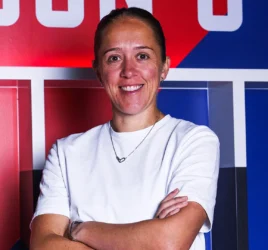Today is a ground-breaking day in the history of the women’s game in England. The announcement of a three-year rights agreement with Sky Sports and the BBC to broadcast the Barclays FAWSL from next season is another huge WOW moment in its progress.
The multi-million pound investment from Sky Sports will see up to 44 live fixtures (and at least 35) across their Sky Sports Football, Premier League and Main Event channels. Meanwhile, the BBC have committed to showing 22 live games per season, with a minimum of 18 matches on BBC One and BBC Two. The FA Player will broadcast the remaining 75 games on the platform. It is a deal that will propel the league into a new audience, with more eyes on it than ever before. As Kathryn Swarbrick, the FA’s Director of Commercial and Marketing, told us: “This level of reach is really important to us, because one of the mantras we have around the women’s game is ‘you have to see her to be her’. I think being able to see all games live across those three platforms means we’ll have millions of eyeballs week in, week out.”
Kelly Simmons, the FA’s Director of the Women’s Professional Game, described the far-reaching nature of this agreement with it helping the FAWSL to continue attracting the best talent, growing and engaging its fanbase and increasing commercial revenue: “This partnership provides a wonderful platform on which to deliver on those ambitions and really to put the WSL in the global forefront of the women’s game.” The money will be used in a mixture of central investments (such as refereeing) and clubs will receive a commercial revenue share – 75% of which will go to those in the Barclays FAWSL, while FA Championship teams will receive 25% to help ensure the development of the pyramid.
“This is a landmark deal for the women’s game. Not just for the WSL – but the whole of the women’s game. It’s really going to help us grow and engage our fanbase. It is bringing in vital revenue into our league and the clubs. Most importantly, it’s providing a fantastic platform to inspire girls and women to play the game.”
Kelly Simmons, FA’s Director of the Women’s Professional Game
We were both admittedly a little emotional reading the press release when it came through. We looked at each other and thought about just how far the game has come. If you had told us 8 ½ years ago, when we started GirlsontheBall, that we would be looking at one of the biggest TV deals in women’s sporting history in 2021, we’re not sure we would have believed you. Back then, with only a couple of hundred people at domestic games and matches shown about once a month on TV, if that, the prospect of this kind of exposure was just a dream. But now, it’s reality.
We know all the clichés; these things take time. It doesn’t happen overnight and that’s true. We need to manage our expectations when it comes to the growth of this beautiful game. Especially when everyone involved desperately wants better and wants things to improve. But looking at the growth of the top level of English women’s football over the last ten years, it’s safe to say it’s been exponential.
It is reward for a lot of hard work that has gone on from several different quarters over the years. No one more than Simmons, whose involvement in the women’s game for almost three decades has seen it transform before our eyes. When we asked her to reflect on what this moment means, she typically continued to look forward, whilst acknowledging the moment: “Do you know, I don’t reflect that much because I’m just constantly trying to fight for better. Like all of us, we just desperately want more and better. It’s always about looking forward and trying to fix the things that we’re not happy with. But I suppose today is absolutely a day I think to reflect; to think, “Wow, this feels like one of those real step change moments for the women’s game.”
There is still a lot more to do but we must recognise the scale of this deal and the opportunity it provides the Barclays FAWSL in terms of publicity and the investment for both the top two leagues. Commitment from broadcasters and brands can only lift the game across the board. This is the exposure women’s football deserves. It’s good every once in a while, to take a moment to recognise just how far the game has come. But let’s not rest too long, because there’s lots more to do and the trajectory is only going upwards.


